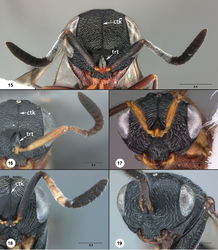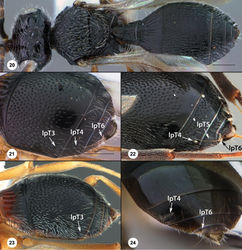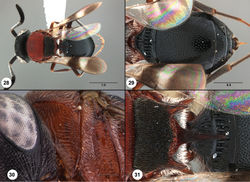Dvivarnus elektrolythron
| Notice: | This page is derived from the original publication listed below, whose author(s) should always be credited. Further contributors may edit and improve the content of this page and, consequently, need to be credited as well (see page history). Any assessment of factual correctness requires a careful review of the original article as well as of subsequent contributions.
If you are uncertain whether your planned contribution is correct or not, we suggest that you use the associated discussion page instead of editing the page directly. This page should be cited as follows (rationale):
Citation formats to copy and paste
BibTeX: @article{Talamas2016JournalofHymenopteraResearch, RIS/ Endnote: TY - JOUR Wikipedia/ Citizendium: <ref name="Talamas2016Journal of Hymenoptera Research">{{Citation See also the citation download page at the journal. |
Ordo: Hymenoptera
Familia: Scelionidae
Genus: Dvivarnus
Name
Dvivarnus elektrolythron Talamas & Mikó sp. n. – Wikispecies link – ZooBank link – Pensoft Profile
Description
Color of antennae in female: brown throughout with dense white setae on A2–A4. Color of mesosoma: mesoscutellum and propodeum black, metascutellar spine brown, otherwise red. Color of head: except interantennal process, black. Setation of torular triangle: present. Continuity of torular triangle and central keel: torular triangle opened dorsally, not continuous reduced central keel. Color of interantennal process: yellowish brown. Setation of frons: transverse strip directly above interantennal process glabrous, otherwise setose. Sculpture of dorsal frons: strigose. Sculpture of vertex: strigose.
Epomial carina: indistinguishable from dorsoventral striation. Netrion in lateral view: extending dorsally to proximity of mesothoracic spiracle. Netrion sulcus: complete, extending dorsally to posterior margin of pronotum. Sculpture of vertical face of pronotum: dorsoventrally strigose anteriorly, longitudinal striate posteriorly. Sculpture of mesoscutum: finely punctate. Density of setation on medial mesoscutum: dense. Notaulus: absent. Sculpture of scutoscutellar sulcus: smooth. Orientation of transaxillar carina: projecting posterolaterally. Sculpture of mesoscutellum: finely areolate. Density of setae on lateral margin of mesoscutellum: sparse. Posterior margin of mesoscutellum: convex between mesoscutellar spines. Median mesoscutellar spine: present. Lateral extreme of posterior scutoscutellar sulcus: foveae terminating below mesoscutellar spine. Sculpture of metanotal trough: smooth with elongate furrow in ventral half. Lateral propodeal carina: absent. Forewing pattern in female: wing membrane and setae brown posterior to marginal vein and in distal third, separated by a band of hyaline membrane and white setae. Sculpture of metapleural sulcus: smooth. Sculpture of dorsal metapleural area: transversely rugose. Sculpture of ventral metapleural area: transversely rugose. Number of setae on lateral T1: 3. Sculpture of T4: punctate. Lateral patch on T5: present. Number of apical setae on T7: 2.
Diagnosis
Dvivarnus elektrolythron may be separated from females of Dvivarnus mikuki and Dvivarnus agamades by the incomplete central keel on the frons (Fig. 15), the form of the lateral patch on T4 (Figs 22, 29), and by the medially convex posterior margin of the mesoscutellum.
Etymology
The epithet for this species refers to the bright red color on the mesosoma of this species. It is derived from the words elektron which in Classical Greek means “amber” and, by extension in modern times, “electricity”, and lythron, meaning “gore”. The name is treated as a noun in apposition.
Link to distribution map
http://hol.osu.edu/map-large.html?id=403212
Material examined
Holotype, female: IVORY COAST: Savanes Rég., Korhogo Dept., Konborodougou, 18.III–21.III.1984, M. Matthews, USNMENT01109168 (deposited in CNCI).
Original Description
- Talamas, E; Mikó, I; Copeland, R; 2016: Revision of Dvivarnus (Scelionidae, Teleasinae) Journal of Hymenoptera Research, (49): 1-23. doi
Images
|



